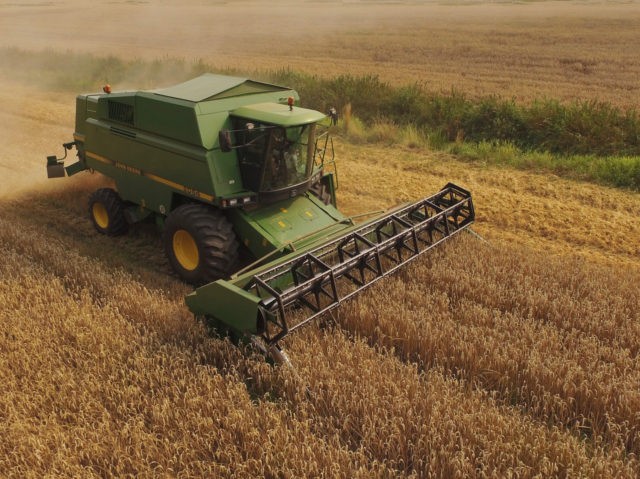The world may be careering towards global famine as Russia blocks ships exporting grain from Ukraine.
Famine is now on the cards for many across the world, with food insecurity dramatically increasing as a result of the ongoing invasion of Ukraine and the associated sanctions war between Russia and the West.
Known as the breadbasket of Europe, Ukraine is responsible for a significant share of the world’s grain production, with both it and Russia usually exporting over 30 per cent of the world’s wheat alone.
However, according to a report by Deutsche Welle, that vital supply is now being threatened, with Russian forces blocking Ukrainian grain exports from traversing the Black Sea.
“Zero [grain] is currently being exported from the ports of Ukraine — nothing is leaving the country at all,” the publication reports Jörg-Simon Immerz, who heads up grain trading agency BayWa, as saying.
The crop trading tsar also noted that exports from Russia had become “very limited” which will likely add to supply disruptions.
As a result, a number of locations across the world are looking at serious issues regarding food security, with the UN’s special rapporteur on the right to food, Michael Fakhri, now warning that global famine is on the cards as a result of the ongoing Russian invasion of Ukraine.
“For the last three years, global rates of hunger and famine have been on the rise,” The Guardian reports Fakhri as saying. “With the Russian invasion, we are now facing the risk of imminent famine and starvation in more places around the world.”
“Food should never be weaponised and no country in the world should be driven into famine and desperation,” the special rapporteur added.
Perhaps the starkest example of a nation that is under serious threat from this supply crisis is Yemen.
According to an Oxfam report, Yemen — which is already facing extreme difficulties supplying food to its people amid years of internecine warfare and a brutal Saudi military intervention — imported around 90 per cent of its food as of 2017, with a more recent report noting that 30 per cent of the country’s wheat imports alone come from Ukraine.
Now, as a result of the ongoing war in Eastern Europe, the country is facing an even worse situation than it is already in.
“Our humanitarian dollar is really being stretched to a breaking point,” said Shaza Moghraby of the UN Food Program, warning that the increased price of grain as a result of food scarcity could have devastating effects on Yemen.
“Before the Ukraine crisis erupted in February, we were warning about a year of unprecedented hunger in Yemen,” the UN official said, noting that the global organisation has already had to cut rations to the region over a lack of necessary funds.
“Those who can somehow get by, barely, will soon join the ranks of those 5 million [Yemenis at immediate risk of famine] if we continue providing them with just half of the rations,” she added.
While regions such as Yemen are most at risk from the lack of Ukrainian exports, far more wealthy regions will also likely face extreme difficulties as a result of the lack of exports.
One senior EU agri-food official has warned that there is serious “suffering” ahead for the bloc as a result of a dramatic decrease of food security, with a lack of animal feed, grain, and fertiliser likely to cause issues for Europe and beyond.
Another senior official from a major fertiliser company also echoed this sentiment, warning that a “global food crisis” was imminent over a lack of available fertiliser, in particular.
Substantial amounts of the extremely important farming resource are imported from Russia and Ukraine, with a lot of the raw materials required to make fertilisers also being imported from these two countries, compounding the issue.
“Half the world’s population gets food as a result of fertilisers… and if that’s removed from the field for some crops, [the yield] will drop by 50 per cent,” Svein Tore Holsether, who heads up agri company Yara International, is reported as saying.
“For me, it’s not whether we are moving into a global food crisis – it’s how large the crisis will be,” he said.
Some countries have responded rather quickly to the impending crisis, with the Hungarian government banning grain exports and the Irish government now asking farmers to grow more grain in the hopes of mitigating some of the damage that will be done to local industry, for example.
Others, however, have seemingly not taken the threat of an impending global famine nearly as seriously.
Despite a wealth of global experts warning of the future risks, Scotland’s devolved government has chosen to prioritise its leftist green agenda over impending food shortages.
The nation’s Biodiversity Minister, Canadian-born Lorna Slater, has dismissed calls for land earmarked for rewilding to be used to grow crops, despite farmers warning of a drastic drop in Scottish food security.
“We are still in a nature emergency that hasn’t gone away… so it’s a no [to allowing farmers to grow on land marked for rewilding efforts],” the minister said, patronisingly dismissing farmers’ concerns over impending Scottish food insecurity.

COMMENTS
Please let us know if you're having issues with commenting.